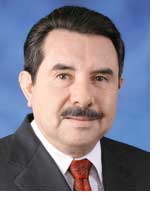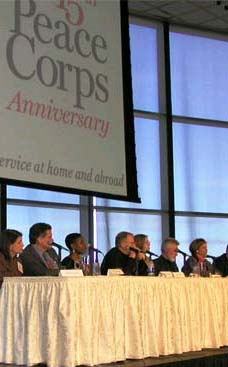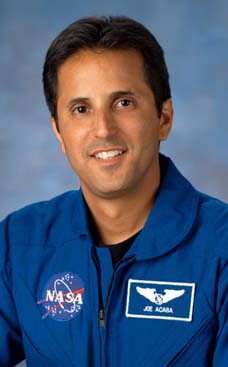2006.04.05: April 5, 2006: Headlines: Hispanic Issues: Peace Corps: Hispanic Association of Colleges and Universities (HACU) signs agreement with Peace Corps
Peace Corps Online:
Peace Corps News:
Peace Corps Library:
Hispanic Studies:
January 23, 2005: Index: PCOL Exclusive: Hispanic Issues and Hispanic Studies :
2006.04.05: April 5, 2006: Headlines: Hispanic Issues: Peace Corps: Hispanic Association of Colleges and Universities (HACU) signs agreement with Peace Corps
Hispanic Association of Colleges and Universities (HACU) signs agreement with Peace Corps

"HACU is honored to enter into a partnership with a great organization like the Peace Corps. HACU works to enrich the educational lives of Hispanic students and the Peace Corps experience will benefit them educationally and professionally. At the same time, the Peace Corps will help to make the gifts of Hispanic students, the future leaders of our country, available to the world," said Antonio Flores, President and CEO of HACU.
Hispanic Association of Colleges and Universities (HACU) signs agreement with Peace Corps
Peace Corps Collaborates With Hispanic Association of Colleges and Universities to Increase Volunteer Opportunities
Caption: Antonio Flores, President and CEO of the Hispanic Association of Colleges and Universities (HACU)
WASHINGTON, D.C., April 5, 2006 – The Peace Corps and the Hispanic Association of Colleges and Universities (HACU) have made their longtime informal partnership official by signing an agreement that strengthens their cooperative relationship. Specifically, the agreement will help the Peace Corps better reach Hispanic-American students who want to share their skills and experience with the citizens of the world.
Through the collaboration, the Peace Corps will offer HACU and the students of more than 400 U.S. member institutions increased career, educational achievement and training prospects, while participating in related outreach efforts. HACU member campuses, which collectively enroll approximately two-thirds of all Hispanics in higher education, will provide opportunities for Peace Corps representatives to share information with students.
"The Hispanic-American student community offers immense resources and skills to the Peace Corps," said Peace Corps Director Gaddi H. Vasquez. "We appreciate that HACU has expressed such a strong interest in working with the Peace Corps to increase awareness and opportunities for its members, as they help Peace Corps best represent the true diverse face of America."
"HACU is honored to enter into a partnership with a great organization like the Peace Corps. HACU works to enrich the educational lives of Hispanic students and the Peace Corps experience will benefit them educationally and professionally. At the same time, the Peace Corps will help to make the gifts of Hispanic students, the future leaders of our country, available to the world," said Antonio Flores, President and CEO of HACU.
Over the past ten years, HACU and the Peace Corps have worked together in an informal capacity, but this agreement strengthens their level of cooperation and brings benefits to both organizations. Currently there are 223 self-identified Hispanic Peace Corps volunteers, comprising 3 percent of the volunteers currently in service. The new initiative will work toward the common goal of increasing the number of Hispanics who become Peace Corps volunteers.
HACU was established in 1986 with a founding membership of eighteen institutions. Today, HACU represents more than 450 colleges and universities committed to Hispanic higher education success in the U.S., Puerto Rico, Latin America and the Iberian peninsula. Although HACU member institutions in the U.S. represent less than 10 percent of all higher education institutions nationwide, together they are home to more than two-thirds of all Hispanic college students.
When this story was posted in March 2006, this was on the front page of PCOL:





Peace Corps Online The Independent News Forum serving Returned Peace Corps Volunteers
 | History of the Peace Corps
PCOL is proud to announce that Phase One of the "History of the Peace Corps" is now available online. This installment includes over 5,000 pages of primary source documents from the archives of the Peace Corps including every issue of "Peace Corps News," "Peace Corps Times," "Peace Corps Volunteer," "Action Update," and every annual report of the Peace Corps to Congress since 1961. "Ask Not" is an ongoing project. Read how you can help. |
 | The Peace Corps Library
The Peace Corps Library is now available online with over 40,000 index entries in 500 categories. Looking for a Returned Volunteer? Check our RPCV Directory. New: Sign up to receive PCOL Magazine, our free Monthly Magazine by email. Like to keep up with Peace Corps news as it happens? Sign up to recieve a daily summary of Peace Corps stories from around the world. |
 | Peace Corps suspends program in Bangladesh
Peace Corps Director Gaddi H. Vasquez announced the suspension of the Peace Corps program in Bangladesh on March 15. The safety and security of volunteers is the number one priority of the Peace Corps. Therefore, all Peace Corps volunteers serving in Bangladesh have safely left the country. More than 280 Peace Corps volunteers have served in Bangladesh since the program opened in November 1998. Latest: What other newspapers say. |
 | Invitee re-assigned after inflammatory remarks
The Peace Corps has pulled the invitation to Derek Volkart to join the Morocco Training Program and offered him a position in the Pacific instead after officials read an article in which he stated that his decision to join the Peace Corps was in "response to our current fascist government." RPCV Lew Nash says that "If Derek Volkart spoke his mind as freely in Morocco about the Moroccan monarchy it could cause major problems for himself and other Peace Corps volunteers." Latest: Volkart reverses stance, takes new assignment in Paraguay. |
 | March 1, 1961: Keeping Kennedy's Promise
On March 1, 1961, President John F. Kennedy issues Executive Order #10924, establishing the Peace Corps as a new agency: "Life in the Peace Corps will not be easy. There will be no salary and allowances will be at a level sufficient only to maintain health and meet basic needs. Men and women will be expected to work and live alongside the nationals of the country in which they are stationed--doing the same work, eating the same food, talking the same language. But if the life will not be easy, it will be rich and satisfying. For every young American who participates in the Peace Corps--who works in a foreign land--will know that he or she is sharing in the great common task of bringing to man that decent way of life which is the foundation of freedom and a condition of peace. " |
 | Paid Vacations in the Third World?
Retired diplomat Peter Rice has written a letter to the Wall Street Journal stating that Peace Corps "is really just a U.S. government program for paid vacations in the Third World." Director Vasquez has responded that "the small stipend volunteers receive during their two years of service is more than returned in the understanding fostered in communities throughout the world and here at home." What do RPCVs think? |
 | RPCV admits to abuse while in Peace Corps
Timothy Ronald Obert has pleaded guilty to sexually abusing a minor in Costa Rica while serving there as a Peace Corps volunteer. "The Peace Corps has a zero tolerance policy for misconduct that violates the law or standards of conduct established by the Peace Corps," said Peace Corps Director Gaddi H. Vasquez. Could inadequate screening have been partly to blame? Mr. Obert's resume, which he had submitted to the Peace Corps in support of his application to become a Peace Corps Volunteer, showed that he had repeatedly sought and obtained positions working with underprivileged children. Read what RPCVs have to say about this case. |
 | Why blurring the lines puts PCVs in danger
When the National Call to Service legislation was amended to include Peace Corps in December of 2002, this country had not yet invaded Iraq and was not in prolonged military engagement in the Middle East, as it is now. Read the story of how one volunteer spent three years in captivity from 1976 to 1980 as the hostage of a insurrection group in Colombia in Joanne Marie Roll's op-ed on why this legislation may put soldier/PCVs in the same kind of danger. Latest: Read the ongoing dialog on the subject. |
 | Friends of the Peace Corps 170,000 strong
170,000 is a very special number for the RPCV community - it's the number of Volunteers who have served in the Peace Corps since 1961. It's also a number that is very special to us because March is the first month since our founding in January, 2001 that our readership has exceeded 170,000. And while we know that not everyone who comes to this site is an RPCV, they are all "Friends of the Peace Corps." Thanks everybody for making PCOL your source of news for the Returned Volunteer community. |
Read the stories and leave your comments.

Some postings on Peace Corps Online are provided to the individual members of this group without permission of the copyright owner for the non-profit purposes of criticism, comment, education, scholarship, and research under the "Fair Use" provisions of U.S. Government copyright laws and they may not be distributed further without permission of the copyright owner. Peace Corps Online does not vouch for the accuracy of the content of the postings, which is the sole responsibility of the copyright holder.
Story Source: Peace Corps
This story has been posted in the following forums: : Headlines; Hispanic Issues
PCOL32373
13


















